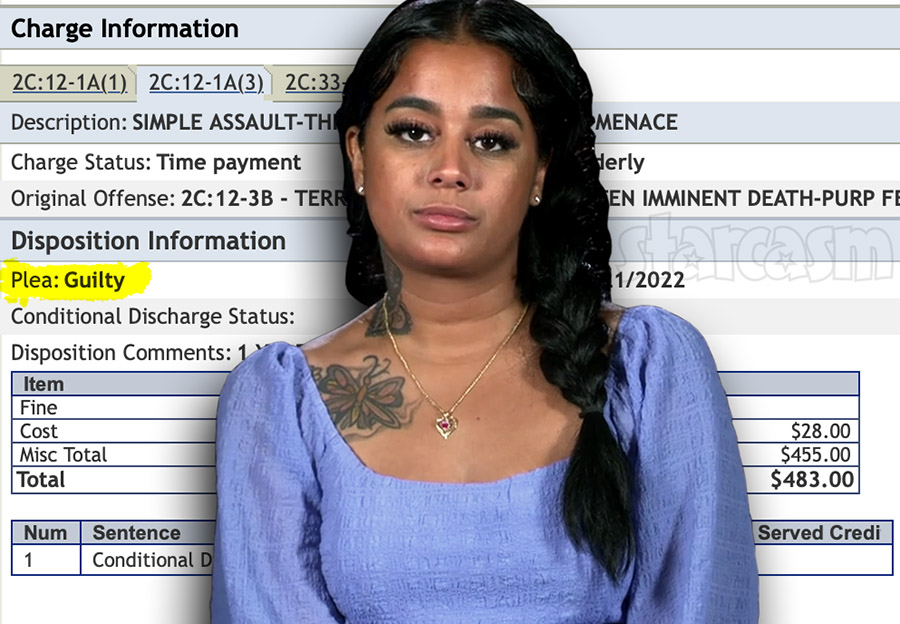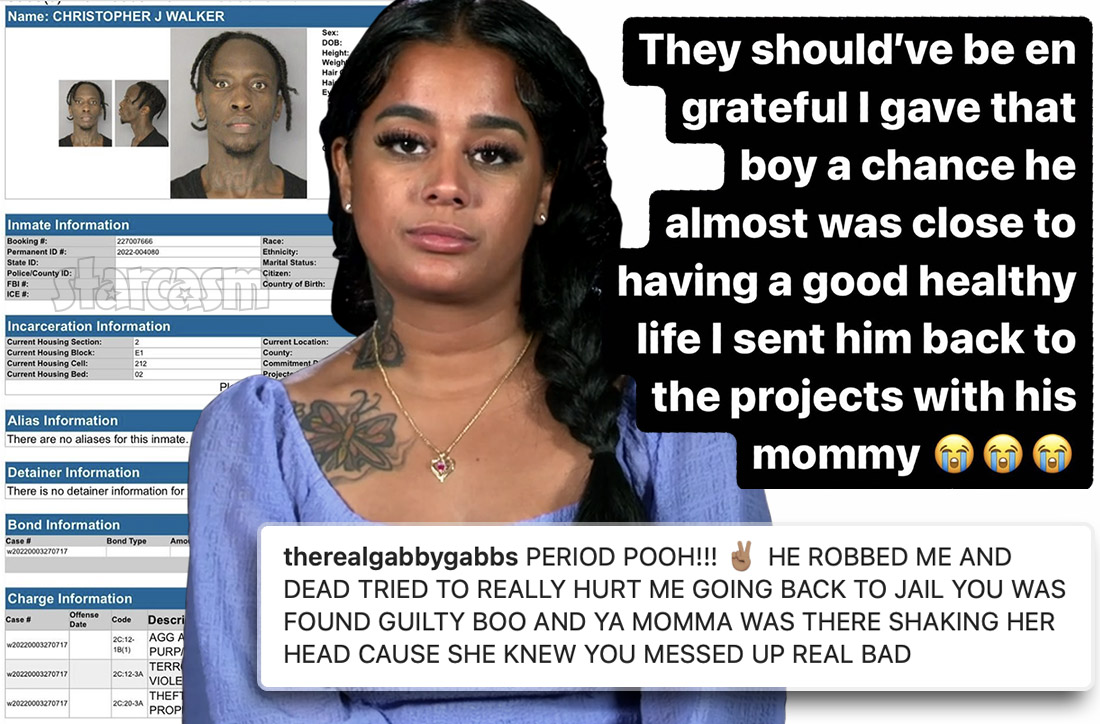A Transformative Tale Of Redemption
Gabby Love After Lockup: A Reflection on Love and Redemption in the Criminal Justice System
"Gabby Love After Lockup" is a reality television series that follows the lives of individuals who have been released from prison as they navigate the challenges of reintegrating into society and finding love. The show provides a unique perspective on the complexities of the criminal justice system and the human capacity for redemption.
The series has garnered significant attention for its raw and authentic portrayal of life after prison. It highlights the struggles that formerly incarcerated individuals face, including stigma, discrimination, and the challenges of finding employment and housing. By shedding light on the challenges of reentry, Gabby Love After Lockup raises awareness and sparks important conversations about the need for reform in the criminal justice system.
Gabby Love After Lockup
The reality television series "Gabby Love After Lockup" has captivated audiences with its portrayal of love and redemption in the criminal justice system. The show's focus on the challenges and triumphs of formerly incarcerated individuals has shed light on important aspects of reentry and rehabilitation. These key aspects include:
- Reentry challenges
- Stigma and discrimination
- Employment barriers
- Housing instability
- Relationship dynamics
- Trauma and mental health
- Recidivism prevention
- Community support
- Systemic reform
Each of these aspects plays a crucial role in the lives of formerly incarcerated individuals as they navigate the challenges of reintegrating into society. "Gabby Love After Lockup" provides a platform for these individuals to share their stories, raising awareness and sparking important conversations about the need for reform in the criminal justice system.
Reentry challenges
Formerly incarcerated individuals face numerous challenges upon reentering society, as depicted in "Gabby Love After Lockup." These challenges can include:
- Employment barriers
Formerly incarcerated individuals often face difficulty finding employment due to stigma and discrimination. They may have gaps in their work history, lack relevant skills, or have criminal records that make employers hesitant to hire them.
- Housing instability
Many formerly incarcerated individuals struggle to find stable housing. They may have difficulty affording rent or finding landlords willing to rent to them. This can lead to homelessness, which can further complicate their efforts to reintegrate into society.
- Relationship dynamics
Formerly incarcerated individuals may face challenges in their relationships with family and friends. They may have lost touch with loved ones while in prison, or their relationships may have been strained by their incarceration. Rebuilding these relationships can be difficult, and it may take time to adjust to being back in society.
- Trauma and mental health
Many formerly incarcerated individuals have experienced trauma during their time in prison. They may have been exposed to violence, abuse, or neglect. This can lead to mental health problems, such as PTSD, anxiety, or depression. These challenges can make it difficult for them to reintegrate into society and maintain healthy relationships.
These are just a few of the reentry challenges that formerly incarcerated individuals face. "Gabby Love After Lockup" provides a valuable platform for these individuals to share their stories and raise awareness of the challenges they face. By shedding light on these challenges, the show can help to break down stigma and discrimination and create a more supportive environment for formerly incarcerated individuals.
Stigma and discrimination
In the context of "Gabby Love After Lockup," stigma and discrimination are significant barriers that formerly incarcerated individuals face as they attempt to reintegrate into society. These challenges can manifest in various forms, creating obstacles in employment, housing, relationships, and overall well-being.
- Employment barriers
Formerly incarcerated individuals often face discrimination in the job market due to their criminal records. Employers may be hesitant to hire them, assuming that they are not qualified or that they pose a risk to the workplace. This can make it difficult for formerly incarcerated individuals to find stable employment and earn a living wage.
- Housing instability
Formerly incarcerated individuals may also face discrimination in the housing market. Landlords may be reluctant to rent to them due to their criminal records or may charge them higher rent. This can make it difficult for formerly incarcerated individuals to find stable housing and can contribute to homelessness.
- Relationship challenges
Formerly incarcerated individuals may also experience stigma and discrimination in their personal relationships. Family and friends may be judgmental or disapproving, and romantic partners may be hesitant to enter into a relationship with someone who has been to prison. This can make it difficult for formerly incarcerated individuals to build and maintain healthy relationships.
- Mental health
Formerly incarcerated individuals may also experience mental health challenges as a result of the stigma and discrimination they face. They may feel isolated, ashamed, or depressed. This can make it difficult for them to cope with the challenges of reentry and to maintain their mental well-being.
Stigma and discrimination are pervasive and damaging forces that can have a profound impact on the lives of formerly incarcerated individuals. "Gabby Love After Lockup" sheds light on these challenges and helps to raise awareness of the need to create a more supportive and inclusive society for all.
Employment barriers
Employment barriers are a significant challenge for formerly incarcerated individuals, as depicted in the reality television series "Gabby Love After Lockup." Employment provides stability, purpose, and a sense of accomplishment, all of which are essential for successful reintegration into society. However, formerly incarcerated individuals often face discrimination and other barriers that make it difficult to find and maintain employment.
One of the most significant employment barriers for formerly incarcerated individuals is the stigma associated with their criminal records. Employers may be hesitant to hire someone with a criminal record, even if they are qualified for the position. This stigma can make it difficult for formerly incarcerated individuals to find any job, let alone a job that pays a living wage.
In addition to stigma, formerly incarcerated individuals may also face other barriers to employment, such as lack of education or job skills, difficulty finding affordable childcare, and transportation challenges. These barriers can make it difficult for them to compete in the job market and secure stable employment.
The consequences of employment barriers for formerly incarcerated individuals can be severe. Unemployment can lead to poverty, homelessness, and recidivism. It can also make it difficult for formerly incarcerated individuals to rebuild their lives and support their families.
"Gabby Love After Lockup" sheds light on the challenges that formerly incarcerated individuals face in finding employment. The show highlights the importance of addressing these barriers and creating a more supportive environment for formerly incarcerated individuals. By raising awareness of this issue, the show can help to break down stigma and discrimination and create a more just and equitable society.
Housing instability
Housing instability is a significant challenge faced by formerly incarcerated individuals, as portrayed in the reality television series "Gabby Love After Lockup." Stable housing is essential for successful reintegration into society, providing a foundation for employment, education, and family life. However, formerly incarcerated individuals often face barriers to obtaining and maintaining stable housing, leading to a cycle of instability and recidivism.
- Lack of affordable housing
Formerly incarcerated individuals often struggle to find affordable housing due to low incomes, poor credit histories, and discrimination from landlords. This can lead to homelessness or unstable living situations, such as couch surfing or living in motels.
- Discrimination
Formerly incarcerated individuals may face discrimination from landlords who are reluctant to rent to them due to their criminal records. This discrimination can make it difficult to find housing and can lead to homelessness.
- Lack of support services
Formerly incarcerated individuals may lack access to support services that can help them find and maintain stable housing. These services may include case management, financial assistance, and counseling.
- Transportation challenges
Formerly incarcerated individuals may face transportation challenges that make it difficult to access housing. This can be a barrier to finding and maintaining employment, as well as accessing other essential services.
Housing instability has a profound impact on the lives of formerly incarcerated individuals. It can lead to homelessness, poverty, and recidivism. Stable housing is essential for successful reintegration into society, and it is important to address the barriers that formerly incarcerated individuals face in obtaining and maintaining housing.
Relationship dynamics
Relationship dynamics play a critical role in the reality television series "Gabby Love After Lockup." The show follows the lives of individuals who have been released from prison as they navigate the challenges of reintegrating into society and finding love. These relationships are often complex and challenging, as the individuals involved have to deal with the stigma of their past and the challenges of building a new life.
One of the most common challenges that couples face on "Gabby Love After Lockup" is the issue of trust. Many of the individuals involved have been in prison for serious crimes, and their partners may have difficulty trusting them. This can lead to problems in the relationship, as the partners may be constantly second-guessing each other and looking for signs of betrayal.
Another challenge that couples face is the issue of communication. Many of the individuals on "Gabby Love After Lockup" have difficulty communicating their feelings and needs. This can lead to misunderstandings and conflict. In some cases, it can even lead to the relationship ending.
Despite the challenges, there are also many positive relationship dynamics on "Gabby Love After Lockup." Many of the couples are able to overcome their challenges and build strong and lasting relationships. These relationships are a testament to the power of love and redemption, and they show that it is possible to find love after prison.
The relationship dynamics on "Gabby Love After Lockup" are a valuable resource for understanding the challenges and triumphs of reentry. By watching the show, viewers can gain a better understanding of the challenges that formerly incarcerated individuals face, and they can learn about the importance of love and support in the reentry process.
Trauma and mental health
Trauma and mental health are significant aspects of "Gabby Love After Lockup," a reality television series that delves into the lives of formerly incarcerated individuals as they navigate the challenges of reintegration and relationships. Trauma and mental health issues are prevalent among this population, shaping their experiences and outcomes.
- Post-traumatic stress disorder (PTSD)
PTSD is a mental health condition that can develop after exposure to traumatic events, such as violence, abuse, or neglect. Symptoms of PTSD include flashbacks, nightmares, avoidance of reminders of the trauma, and difficulty sleeping. PTSD is common among formerly incarcerated individuals, who may have experienced trauma during their time in prison.
- Depression
Depression is a mental health condition characterized by persistent sadness, loss of interest in activities, and feelings of worthlessness. Formerly incarcerated individuals may experience depression due to the stigma, discrimination, and social isolation they face. Depression can make it difficult for them to reintegrate into society and maintain relationships.
- Anxiety
Anxiety is a mental health condition characterized by excessive worry, fear, and nervousness. Formerly incarcerated individuals may experience anxiety due to the uncertainty and challenges they face upon reentry. Anxiety can interfere with their ability to find employment, housing, and build relationships.
- Substance abuse
Substance abuse is a common coping mechanism for trauma and mental health issues. Formerly incarcerated individuals may turn to drugs or alcohol to self-medicate and escape their problems. Substance abuse can lead to addiction, health problems, and further legal troubles.
Trauma and mental health issues can have a significant impact on the lives of formerly incarcerated individuals. They can make it difficult to reintegrate into society, maintain relationships, and live healthy and productive lives. Addressing trauma and mental health issues is essential for successful reentry and recovery. "Gabby Love After Lockup" sheds light on these issues and helps to raise awareness of the need for support and treatment for formerly incarcerated individuals.
Recidivism prevention
Recidivism prevention is a crucial component of the "Gabby Love After Lockup" reality television series. The show follows the lives of formerly incarcerated individuals as they navigate the challenges of reintegration and relationships. By shedding light on the challenges faced by these individuals, "Gabby Love After Lockup" plays a significant role in raising awareness about the importance of recidivism prevention.
Recidivism, or the tendency of a formerly incarcerated individual to re-offend, is a complex issue with multiple contributing factors. These factors include lack of employment opportunities, housing instability, and lack of support systems. "Gabby Love After Lockup" highlights these challenges and shows how they can lead to recidivism. For example, one of the main characters in the show, Gabby, struggles to find a job due to her criminal record. This lack of employment makes it difficult for her to pay her rent and support her family, which increases her risk of re-offending.
However, "Gabby Love After Lockup" also shows how recidivism can be prevented. The show demonstrates the importance of support systems, such as family, friends, and community organizations. These support systems can provide individuals with the resources and emotional support they need to successfully reintegrate into society. For example, another main character in the show, Chris, is able to avoid recidivism with the help of his supportive girlfriend and his involvement in a community mentorship program.
The practical applications of understanding the connection between "Gabby Love After Lockup" and recidivism prevention are significant. By raising awareness about the challenges faced by formerly incarcerated individuals, the show can help to reduce stigma and discrimination. This can lead to increased employment opportunities, housing stability, and access to support services. In turn, these factors can help to reduce recidivism and create a more just and equitable society.
Community support
In the context of "Gabby Love After Lockup," community support plays a vital role in the successful reintegration of formerly incarcerated individuals. This support encompasses a wide range of services and resources that help individuals rebuild their lives and reduce their risk of recidivism.
- Mentorship programs
Mentorship programs pair formerly incarcerated individuals with experienced mentors who provide guidance, support, and resources. These programs help individuals develop job skills, navigate the justice system, and build positive relationships.
- Employment assistance
Employment assistance programs help formerly incarcerated individuals find and retain employment. These programs may provide job training, resume writing assistance, and connections to potential employers.
- Housing support
Housing support programs help formerly incarcerated individuals find and maintain stable housing. These programs may provide financial assistance, case management, and connections to housing resources.
- Family support
Family support is crucial for the successful reintegration of formerly incarcerated individuals. Families can provide emotional support, practical assistance, and a sense of belonging.
Community support plays a vital role in reducing recidivism and promoting successful reintegration. By providing individuals with the resources and support they need, communities can help them rebuild their lives and contribute to society.
Systemic reform
Systemic reform and "Gabby Love After Lockup" are intimately connected. The reality television series sheds light on the challenges faced by formerly incarcerated individuals as they navigate the complexities of reintegration and relationships. Through the personal stories of its participants, "Gabby Love After Lockup" exposes the systemic barriers that hinder successful reentry and highlights the urgent need for transformative change.
Systemic reform encompasses a wide range of policies and practices aimed at addressing the root causes of crime and reducing recidivism. This includes investing in education, job training, and mental health services for incarcerated individuals. It also involves reforming sentencing laws, expanding access to legal aid, and reducing the use of solitary confinement. By tackling the underlying social and economic factors that contribute to crime, systemic reform can create a more just and equitable society that provides opportunities for all.
"Gabby Love After Lockup" provides real-life examples of the challenges faced by formerly incarcerated individuals and the potential impact of systemic reform. One participant in the show, Ashley, struggles to find stable employment due to her criminal record. Despite her efforts to rebuild her life, she faces discrimination from potential employers and landlords. Ashley's story underscores the need for policies that address the barriers faced by formerly incarcerated individuals in the job market and housing sector.
The practical applications of understanding the connection between "Gabby Love After Lockup" and systemic reform are significant. By raising awareness of the challenges faced by formerly incarcerated individuals, the show can help to reduce stigma and discrimination. This can lead to increased employment opportunities, housing stability, and access to support services. In turn, these factors can help to reduce recidivism and create a more just and equitable society.
"Gabby Love After Lockup" has provided a unique and powerful lens into the lives of formerly incarcerated individuals as they navigate the challenges of reintegration and relationships. The series has highlighted the systemic barriers faced by this population, including stigma, discrimination, employment barriers, and housing instability. Through the personal stories of its participants, the show has demonstrated the urgent need for systemic reform to create a more just and equitable society.
One of the key takeaways from the series is that successful reintegration requires a comprehensive approach that addresses not only the individual needs of formerly incarcerated individuals but also the broader social and economic factors that contribute to crime. This includes investing in education, job training, and mental health services, as well as reforming sentencing laws and reducing the use of solitary confinement.
Another important insight from "Gabby Love After Lockup" is that community support plays a vital role in reducing recidivism and promoting successful reentry. This support encompasses a wide range of services and resources, including mentorship programs, employment assistance, housing support, and family support. By providing individuals with the resources and support they need, communities can help them rebuild their lives and contribute to society.
Taylor Swifts Cat Name
Tips For Choosing The Best Gas Powered Remote Control Cars
How To Use "No Debiste Abrir La Puerta Twitter" Like A Pro



ncG1vNJzZmihnaW8tLXBpZxnmZ2ogG%2BwyKCgrZmcpLCmrc2sp5qblah7pLvMaJ6ampKueq271Z5kmp6kmr9uuM6coq6oXp3Brrg%3D